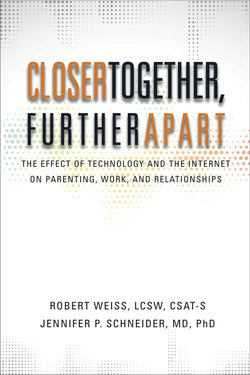Читать книгу Closer Together, Further Apart: The Effect of Technology and the Internet on Parenting, Work, and Relationships - Jennifer Schneider - Страница 15
На сайте Литреса книга снята с продажи.
Here Today, Gone Tomorrow
ОглавлениеA technology (or anything else) is obsolete when it is no longer used. Most often, obsolete means something is out of date and needs to be replaced by something newer and more efficient—or at least a bit shinier. Obsolete items are outmoded, outdated, archaic, antiquated, passé, and unfashionable. And nowhere does obsolescence arrive more quickly than in the world of communication technology.
Consider, for example, the telephone. Brent, a member of the Silent Generation, recalls that as a boy in upstate Washington he had to crank the phone to reach the operator. When Brent asked the operator to connect him with his friend Jimmy, the operator might say, “I think Jimmy is over at Bobby’s house today. Let me check there,” and more often than not she was right.
Brent’s friend Scott, born on the cusp of the Baby Boomer and X Generations, used to dial his friend Michael’s house when he wanted someone to play with. And if Michael wasn’t home, so be it. Scott would have to call back later, leave a message with Michael’s parents, or hop on his bicycle and pedal around the neighborhood to look for his friend.
Today when Scott’s Gen Y nephew Matt wants to call his friend Marshall, he pulls his phone out of his pocket and simply says, “Call Marshall.” The phone does as instructed, and no matter where Marshall is—he could be three states away, vacationing with his family—the call finds Marshall and he picks up. Matt has never spoken to a switchboard operator, never used a rotary dial, never used a pay phone, never called collect, never checked his answering machine, never been paged, and never paid for a long distance call. He has no need to remember a phone number and in fact he’s never actually heard a phone “ring.” The moniker “Ma Bell” means nothing to him. If he time traveled to Brent’s childhood home in upstate Washington, he would have no idea that the strange wooden box hanging on the wall was a telephone. That’s a mere nanobyte of how much technology has changed in just sixty years.
Obsolete or Rapidly Becoming Obsolete Communications/Entertainment Technologies
•phonographs
•8-tracks, cassettes, and reel-to-reel tapes
•transistor radios and boom boxes
•laser discs
•floppy discs
•analogue recordings and recording devices (tape)
•stereo receivers, tape decks, and turntables
•dictation machines
•Walkman and Discman personal stereos
•HAM and CB radios
•Super 8 and 16 mm film
•Betamax and VHS
•typewriters and carbon paper
•word processors
•dot-matrix printers
•dial-up modems
•land-based telephones
•watches (worn for functionality rather than as an accessory)
•PDAs and pagers
•print newspapers and printed phonebooks
•film cameras
•analog copy machines
•book and record collections
•photo albums
Some of these obsolete analog technologies will be missed, others not so much. For instance, no one laments the demise of screechy dial-up modems. Nor is anyone pining for the days of 8-track tapes (which would frequently stop in the middle of a song and switch tracks, interrupting the music). On the other hand, cassette tapes—the technology that replaced 8-tracks—are greatly missed by many Gen Xers because you could record onto a blank cassette tape, making a “mix tape” of your favorite songs. Giving a girl (or boy) a personalized mix tape was a great way to let her (or him) know how you felt, especially if that tape contained a liberal sprinkling of sappy love songs. Sure, with current technology you can e-share a personalized MP3 playlist, but it’s not the same as handing someone a cassette you’ve spent many hours constructing.
And let us not forget the physical places traditionally required to locate, interact with, and purchase the obsolete technologies that are disappearing from the American landscape.
Obsolete or Rapidly Becoming Obsolete Locations
•video and DVD rental stores
•music and record stores
•post offices*
•public libraries (as repositories for new books and periodicals)*
•newspaper stands
•mailboxes
•bookstores
•big box electronics stores
•telephone booths
•travel agencies
*While post offices and public libraries will likely continue in some social/community-based format, their original intended purpose and need has forever been altered and made increasingly irrelevant.
